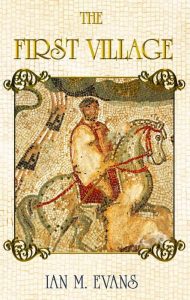
An entertaining and lively tale of love and ambition set around the end of the Roman occupation of Britain. It offers an alternative telling of the ‘Dream of Macsen’, from the medieval manuscript The Mabinogio
Wales AD 383 is the most remote province of Roman-occupied Britain. Magnus Maximus, known to the Celts as Macsen Wledig, has grown restless with his role as general of the Roman army in Britannia. His nights are broken by dreams of an impossibly beautiful Welsh maiden. He sets his sights on moving his legions out of Britannia to challenge Gratianus – the emperor of the Western Roman Empire.
His most senior officer, Flavius Arcadius, is panicked. The army’s withdrawal will leave his family, neighbours and all of Britannia unprotected, at the mercy of conflict between the local tribes and the even greater threat of pagan invaders from the east. He grasps at his influential mother’s novel ideas for a safer future – a fortified villa surrounded by a self-sufficient agricultural community – if only he could find a way to stay behind when the legions depart. Flavius starts to plot…
Maximus is sufficiently in thrall to his fantasies to allow Flavius to set out with his two friends and fellow officers, Severus and Caradocus, to seek out this dream girl and bring her to him
The three soldiers wander through the wilds of Cymru, intent only on delaying their return. To their astonishment, they come across the youngest daughter of a wily Celtic chieftain. Could she be the maiden of Maximus’s dream? Flavius and Severus are determined to deliver the girl, Elen, to Maximus, ensuring a defensive treaty with a powerful Celtic tribe. Caradocus, however, engineers their escape.
Elen’s beauty is matched by her wit and intelligence and her courage is demonstrated when she saves them both from capture. Before long, the two runaways are in love. But Caradocus and Elen are going to need more than their wits to survive, when they are being hunted – not just by Flavius and Severus, but by Elen’s father and, for all they know, the full might of the Roman army…
Title: The First Village
Author: Ian M. Evans
ISBN: 9781784655334
Genre: Historical fiction / Historical romance / Myth & legend told as fiction
Imprint: Vanguard Press

BOOK REVIEW
TITLE INFORMATION
THE FIRST VILLAGE
Ian M. Evans
Vanguard Press (398 pp.)
$16.99 paperback, $5.99 e-book
ISBN: 978-1-78465-533-4; March 28, 2019
KIRKUS REVIEWS
Political intrigue and erotic charge fuel this novel set in the waning years of the Roman Empire.
“Stories get better and better after four hundred years,” according to this tale about Gen. Magnus Maximus, commander
of the Roman forces in Britain in the twilight years of the fourth century. But if a 400-year-old story is great, a
1,600-year-old yarn must be even better. Such is the logic of Evans’ (Menace, 2017, etc.) engrossing work of historical
fiction, which puts flesh on the biography of Maximus, one of Rome’s more intriguing figures. Maximus is a military
leader-and a fine one at that-but the grumblings of his troops against the local emperor, Gratianus, have given the
general dreams of the throne. Could he turn his military power into an empire? The temptation is real. Yet Maximus has
other dreams too; these nighttime visions are of a woman of surpassing grace named Elen, who the author is at great
pains to remind readers is the “most beautiful woman” that just about anyone has ever seen. Driven by his
ambitions- both political and romantic-Maximus puts two plans in motion, one to become emperor and the other to win
the literal woman of his dreams. All good historical fiction must start with superb history, and Evans has picked an
excellent source. The general is complicated in all the right ways: Ambitious and talented, proud and provocative,
Maximus is a protagonist pulled directly from central casting. And while the author is supported by the historical record, he
is not confined by it, and he tweaks and bends the story adeptly to fit his own narrative needs. Perhaps the only small
defect lies in the prose itself: Evans is an academic by training, and sometimes his book reads less like a novel on ancient
Rome than a scholarly essay about it. But his writing is never too purple, and readers will be happy to trudge through the
occasional linguistic thicket to find out what happens next.
A maximally engaging tale of ancient Rome.
Kirkus lndie, Kirkus Media LLC, 2600 Via Fortuna Suite 130 Austin, TX 78746
indie@kirkusreviews.com


